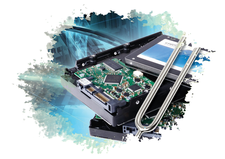Optimize flash memory in Linux
Fine-tuned

Solid state drives make everything run faster and more smoothly, but you can squeeze out even more performance with some practical optimization steps.
Solid-State drives (SSDs) are quite different from old-fashioned hard disks, and you'll have to learn some new techniques if you want to tune up performance. This article highlights some important steps for optimizing SSDs.
Updating the Firmware
Firmware is just as important as hardware, and the flash chips in the SSD are no exception. Special software mechanisms such as wear leveling and garbage collection improve the efficiency of the drive; without these mechanisms, the durability and performance of the SSD would be impaired over its service life. The firmware is thus an important part of the product, and it is also under constant development, which means it is important to update the firmware.
Linux users are often a little envious when they see how easy it is to install new firmware in Windows by clicking around in a graphical interface. Intel and Samsung provide Linux binaries for their datacenter SSDs, but for their consumer products, users need to boot an ISO file.
[...]
Buy this article as PDF
(incl. VAT)
Buy Linux Magazine
Subscribe to our Linux Newsletters
Find Linux and Open Source Jobs
Subscribe to our ADMIN Newsletters
Support Our Work
Linux Magazine content is made possible with support from readers like you. Please consider contributing when you’ve found an article to be beneficial.

News
-
Two New Distros Adopt Enlightenment
MX Moksha and AV Linux 25 join ranks with Bodhi Linux and embrace the Enlightenment desktop.
-
Solus Linux 4.8 Removes Python 2
Solus Linux 4.8 has been released with the latest Linux kernel, updated desktops, and a key removal.
-
Zorin OS 18 Hits over a Million Downloads
If you doubt Linux isn't gaining popularity, you only have to look at Zorin OS's download numbers.
-
TUXEDO Computers Scraps Snapdragon X1E-Based Laptop
Due to issues with a Snapdragon CPU, TUXEDO Computers has cancelled its plans to release a laptop based on this elite hardware.
-
Debian Unleashes Debian Libre Live
Debian Libre Live keeps your machine free of proprietary software.
-
Valve Announces Pending Release of Steam Machine
Shout it to the heavens: Steam Machine, powered by Linux, is set to arrive in 2026.
-
Happy Birthday, ADMIN Magazine!
ADMIN is celebrating its 15th anniversary with issue #90.
-
Another Linux Malware Discovered
Russian hackers use Hyper-V to hide malware within Linux virtual machines.
-
TUXEDO Computers Announces a New InfinityBook
TUXEDO Computers is at it again with a new InfinityBook that will meet your professional and gaming needs.
-
SUSE Dives into the Agentic AI Pool
SUSE becomes the first open source company to adopt agentic AI with SUSE Enterprise Linux 16.

